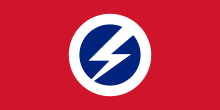British Union of Fascists
The British Union of Fascists (BUF) was a British fascist political party in the 1930s.
founding
After his New Party was unsuccessful in 1931, the former Labor MP Oswald Mosley went on a trip to study the new political movements of Benito Mussolini and other fascists. He then decided to unite the existing smaller, ultra- nationalist and fascist groups in his home country and founded the British Union of Fascists for this purpose in 1932 . Mosley saw himself in a role similar to the Italian "Duce" Mussolini and also modeled the BUF after the fascist movements in Italy and other European countries.
ideology
The BUF was anti-communist and protectionist . She called for the abolition of parliamentary democracy and the creation of a corporate state . According to its own information, the BUF had up to 50,000 members. In the first few years she was supported by the Daily Mail ; this support went up to the headline Hurray for the Blackshirts! . Among her supporters were the novelist Henry Williamson and the military theorist John Frederick Charles Fuller .
history
Mosley introduced black uniforms for his party early on, known as black shirts . Not least because of the marches of the Black Shirts, however, the party earned only scorn and ridicule from many quarters. The BUF anthem was voiced like the National Socialist Horst Wessel song .
Despite noteworthy, sometimes violent resistance from Jewish, communist and various democratic organizations, the BUF was able to build strongholds in East London . Over the years, the BUF became more and more brutal and anti-Semitic , which removed it from its supporters in the middle class . At a major fascist event in London's Olympia on June 7, 1934, a mass brawl broke out when the Blackshirts tried to throw troublemakers out of the hall. These incidents and the internal party " cleansing operation " of Adolf Hitler in Germany , the so-called Röhm Putsch , resulted in the BUF losing most of its supporters in 1934, so that in 1935 it could not even take part in the general election . Mosley put his supporters off by saying that they wanted to participate all the more successfully in the next election.
The number of members shrank to under 8,000 by 1936. The main activity of the BUF in the following years were marches and demonstrations. The British government saw them as so dangerous that they passed the Public Order Act in 1936 , a law that banned political uniforms and restricted the freedom to demonstrate. In a racially motivated brawl, the so-called Battle of Cable Street in October 1936, Mosley and his supporters were forced to retreat by a majority of opponents.
In 1936 the party's name was expanded to include the British Union of Fascists and National Socialists at the instigation of William Joyce , a member of the BUF known as a demagogic speaker .
Mosley and 740 other fascist functionaries were interned during World War II , the BUF banned in May 1940.
All of Mosley's attempts at comeback in the post-war period, for example with the Union Movement party , were unsuccessful.
See also
literature
- Arnd Bauerkämper : The "radical right" in Great Britain. Nationalist, anti-Semitic and fascist movements from the late 19th century to 1945. Göttingen 1991.
